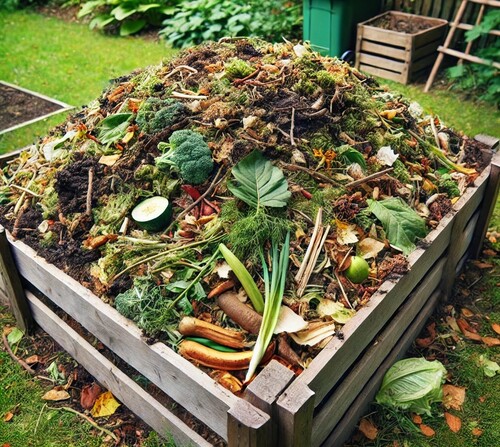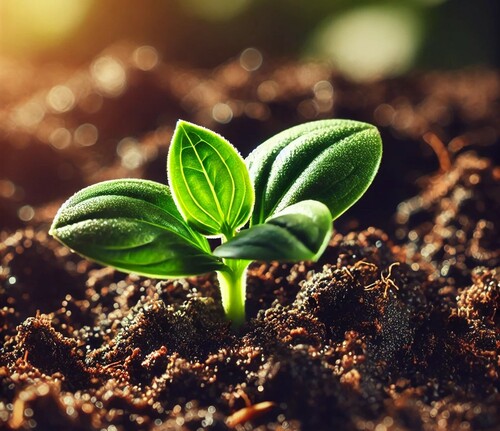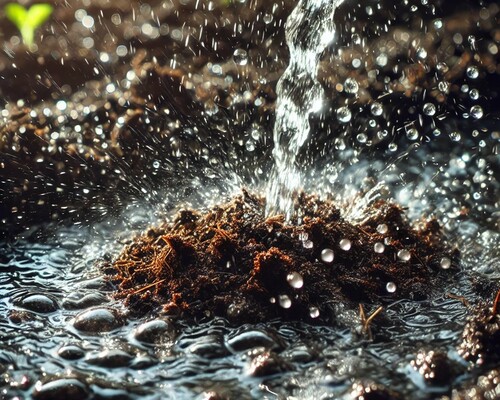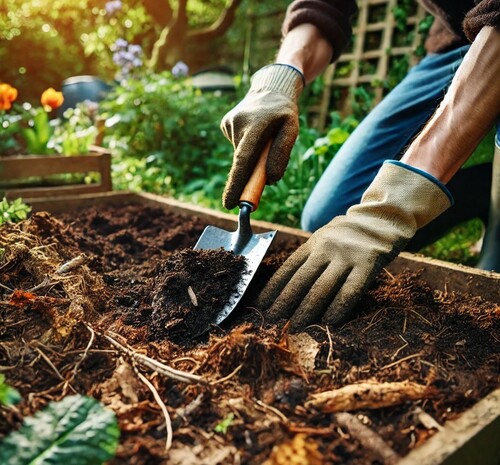The Impact of Composting on Soil Health and Plant Growth
Introduction
Composting transforms ordinary garden waste into black gold for your soil, revolutionizing plant growth and garden health. This natural process enriches soil structure and provides essential nutrients that dramatically improve gardening success. Whether you’re a seasoned gardener or just starting out, understanding composting’s impact on soil health can elevate your gardening game to new heights.
Soil health lies at the heart of successful gardening, determining everything from plant growth and flower production to fruit yield and disease resistance. Despite its crucial role, soil health is often overlooked, leading to disappointing results. Many turn to synthetic fertilizers only to find themselves trapped in a cycle of diminishing returns as soil quality continues to decline. Composting offers a sustainable, effective solution to this challenge.
Soil Enrichment Through Composting

A Backyard Compost Pile with Organic Materials
Improving Soil Structure
Compost fundamentally transforms soil texture and structure in ways that benefit both the soil ecosystem and plant growth:
- Breaks up clay soils, improving drainage and root penetration
- Adds body to sandy soils, increasing water retention
- Creates optimal pore space for root growth and soil microorganisms
- Prevents soil compaction, allowing better air circulation
The improved soil structure from compost addition leads to:
- Enhanced root development, allowing plants to establish stronger foundations
- Better water infiltration, reducing runoff and erosion
- Reduced erosion and soil loss during heavy rain events
- Increased soil stability, creating a more resilient growing environment
The physical changes compost brings to soil structure have far-reaching effects:
- In Clay Soils: Creates channels for better root penetration and water drainage
- In Sandy Soils: Acts like a sponge, improving water retention
- In All Soils: Enhances microbial activity and nutrient cycling
Additional benefits include:
- Increases the soil’s cation exchange capacity (CC)
- Promotes beneficial fungal growth, particularly mycorrhizal fungi
- Creates a habitat for earthworms and other beneficial soil organisms
- Stabilizes soil pH, buffering against rapid changes
- Improves soil aggregation, creating better tilth
Nutrient Content
Compost enriches soil with a complete spectrum of essential nutrients, providing a balanced diet for plants:
Macronutrients:
- Nitrogen (N): Vital for leaf growth and chlorophyll production
- Phosphorus (P): Essential for root development and flower formation
- Potassium (K): Crucial for overall plant health and stress resistance
- Calcium (Ca): Important for cell wall development
- Magnesium (Mg): Necessary for photosynthesis
- Sulfur (S): Helps with protein formation
Micronutrients:
- Iron: Essential for chlorophyll production
- Manganese: Aids in photosynthesis and nitrogen processing
- Copper: Important for seed production
- Zinc: Necessary for plant growth hormones
- Boron: Critical for cell wall formation
- Molybdenum: Helps with nitrogen fixation
Unlike synthetic fertilizers, compost releases nutrients slowly , providing a steady supply that plants can utilize efficiently over time. This slow-release mechanism:
- Prevents nutrient leaching into groundwater
- Reduces the risk of nutrient burn
- Provides consistent nutrients throughout the growing season
- Supports more balanced plant growth
- Enhances the efficiency of nutrient uptake
Compost enriches soil through a continuous cycle of nutrient release and uptake. This is beneficial for many reasons:
- Organic matter decomposition releases nutrients gradually
- Beneficial microorganisms help convert nutrients into plant-available forms
- Improved soil structure enhances nutrient retention
- Enhanced root systems can access nutrients more effectively
The nutrient content of compost varies depending on the materials used:
Green Materials (Nitrogen-rich):
- Grass Clippings: High in nitrogen
- Kitchen Scraps: Varied nutrients
- Coffee Grounds: Nitrogen and magnesium
- Fresh Leaves: Nitrogen and moisture
- Green Pruned Materials: Balanced nutrients
- Vegetable Waste: Diverse mineral content
Brown Materials (Carbon-rich):
- Dried Leaves: Carbon and trace minerals
- Straw: Carbon and silica
- Paper Products: Carbon
- Wood Chips: Long-lasting carbon source
- Cardboard: Carbon and structural material
- Pine Needles: Acidic carbon source
Compost and Plant Growth

A Plant Sprouting from Healthy, Nutrient-Rich Soil
Case Studies
Research consistently demonstrates the positive impact of compost on plant growth:
1. Vegetable Garden Study (University of California):
- 40% increase in tomato yield
- 50% reduction in water usage
- Improved flavor in leafy greens
- 25% increase in vitamin content of vegetables
- Earlier harvest times by an average of 7-10 days
2. Flower Garden Trial (Royal Horticulture Society):
- Extended blooming period by 2-3 weeks
- Enhanced flower color intensity
- Increased resistance to pest problems
- 30% more blooms per plant
- Stronger stem development
3. Urban Farming Project (Chicago Botanical Garden):
- Doubled productivity in raised beds
- Reduced fertilizer needs by 75%
- Improved soil moisture retention by 65%
- Enhanced pollinator activity by 45%
- Decreased plant stress during heat waves
These studies consistently show that compost-enriched soil produces:
- Stronger, more resilient plants
- Higher yields in edible crops
- More vibrant flowers with longer blooming periods
- Improved root systems
- Better resistance to environmental stresses
- Enhanced fruit and vegetable flavor
- Increased nutrient density in produce
Disease Resistance
Compost boosts plant immunity through multiple mechanisms:
- Introduces beneficial microorganisms that outcompete pathogens
- Strengthens plant cell walls, making them more resistant to infection
- Improves overall plant health, enabling better natural defense responses
Studies show up to 60 percent reduction in common plant diseases when using compost-enriched soil. This disease suppression works through several pathways:
- Competitive Exclusion: Beneficial microbes outcompete pathogens
- Antibiotic Production: Some microorganisms produce natural antibiotics
- Induced Systematic Resistance: Compost triggers plants’ immune responses
- Improved Plant Vigor: Healthier plants naturally resist disease better
Common diseases reduced by compost use include:
- Root rot
- Powdery mildew
- Fusarium wilt
- Pythium blight
- Rhizoctonia solani
Environmental Benefits

Water Droplets Nourishing Healthy Garden Soil
Water Retention
Compost significantly improves soil’s relationship with water:
- Increases water-holding capacity by up to 16x in sandy soils
- Reduces irrigation needs by 30-70%
- Prevents water runoff and erosion
- Promotes deeper root growth for better drought resistance
The improved water retention creates a cascade of benefits:
- Reduced water bills
- Lower risk of plant stress during dry periods
- Less frequent need for irrigation
- Improved groundwater recharge
- Reduced runoff and erosion during heavy rains
Carbon Sequestration
Composting plays a crucial role in mitigating changing weather patterns:
- Locks carbon into the soil, removing it from the atmosphere
- Reduces methane emissions from landfills
- Decreases reliance on synthetic fertilizers
- Creates a sustainable cycle of nutrient recycling
Every ton of compost can sequester approximately 108 pounds of carbon dioxide. This carbon sequestration occurs through several mechanisms:
- Direct carbon storage in soil
- Increased plant growth, leading to more carbon fixation
- Reduced emissions from decreased synthetic fertilizer use
- Prevention of methane emissions from landfills
Practical Applications

A Gardener Mixing Compost into Nutrient-rich Garden Soil
Using Compost in Gardens
Follow these guidelines for optimal compost application:
1. New Gardens:
- Mix 2-3 inches of compost into the top 6-8 inches of soil
- For heavy clay, increase to 4 inches of compost
- Test soil pH and adjust if necessary
- Consider double digging for maximum incorporation
2. Established Gardens:
- Apply ½ inch layer of compost annually
- Gently work around existing plants
- Use as a mulch around perennials
- Apply in early spring or late fall
3. Specific applications:
- Vegetables: 1-2 inches worked in before planting
- Trees: Mix 20-50% compost into backfill soil
- Lawns: Quarter-inch topdressing in spring or fall
- Container Plants: Use 20-30% compost in potting mix
Tips for success:
- Always use fully mature compost
- Apply when soil is moist but not wet
- Avoid placing compost directly against plant stems
- Monitor plant response and adjust application rates accordingly
Common mistakes to avoid:
- Using uncomposted materials
- Applying too much compost
- Incorporating wet compost
- Neglecting to test soil before application
Conclusion
The impact of composting on soil health extends far beyond simple waste reduction, offering a comprehensive solution for garden improvement and environmental stewardship. By enriching soil structure, providing essential nutrients, and supporting beneficial microorganisms, compost creates the foundation for exceptional plant growth and garden success. Whether you’re looking to boost your vegetable yield, create stunning flower displays, or contribute to environmental sustainability, composting provides the key to unlocking your garden’s full potential. The benefits of composting ripple outward, from the microscopic soil ecosystem to the global environment, making it an essential practice for conscious gardeners and landscapers alike. For expert guidance on composting and professional tree care services that prioritize soil health, contact Arborist Now to transform your outdoor space into a thriving ecosystem.
We may receive affiliate compensation for some of the links below at no cost to you if you decide to make a purchase.


